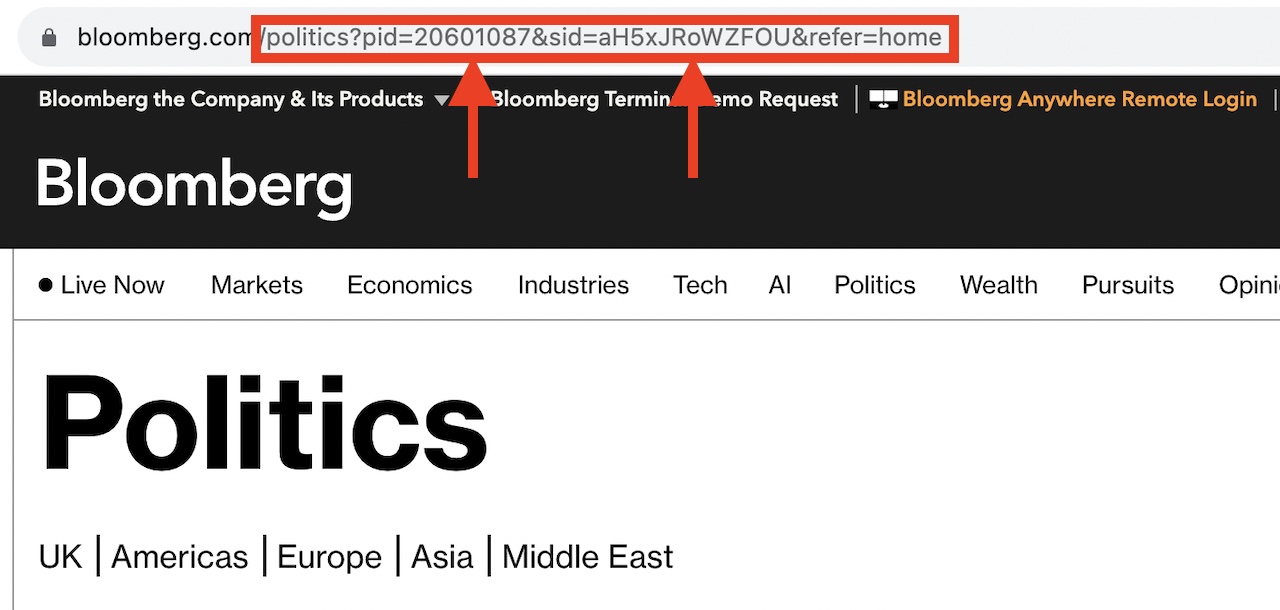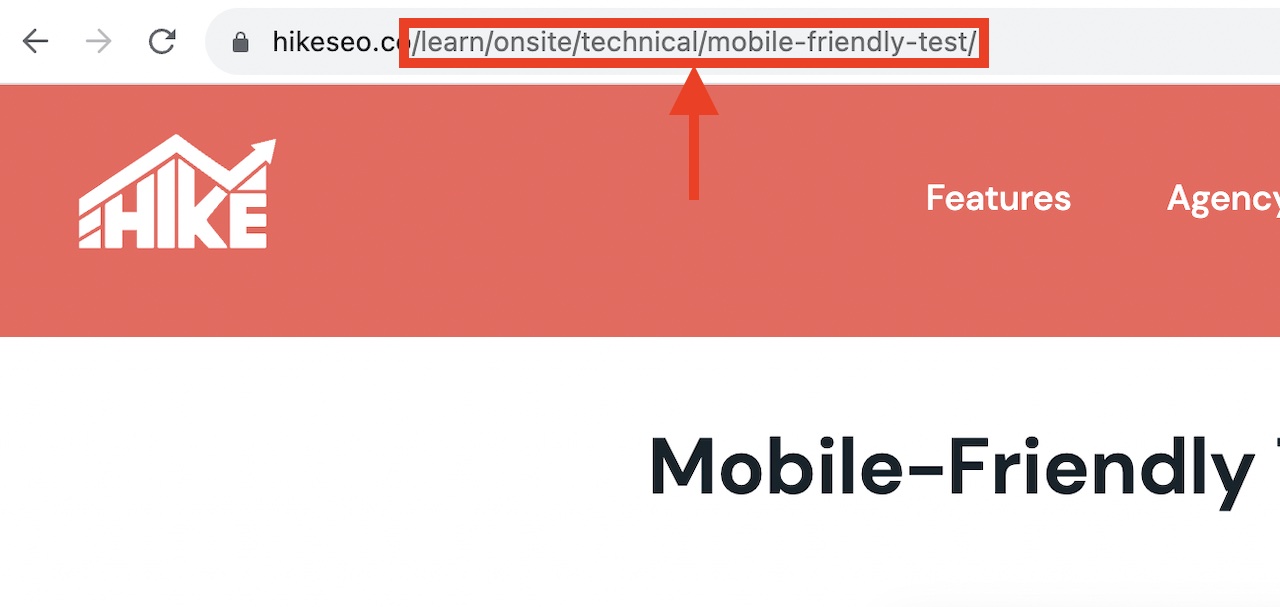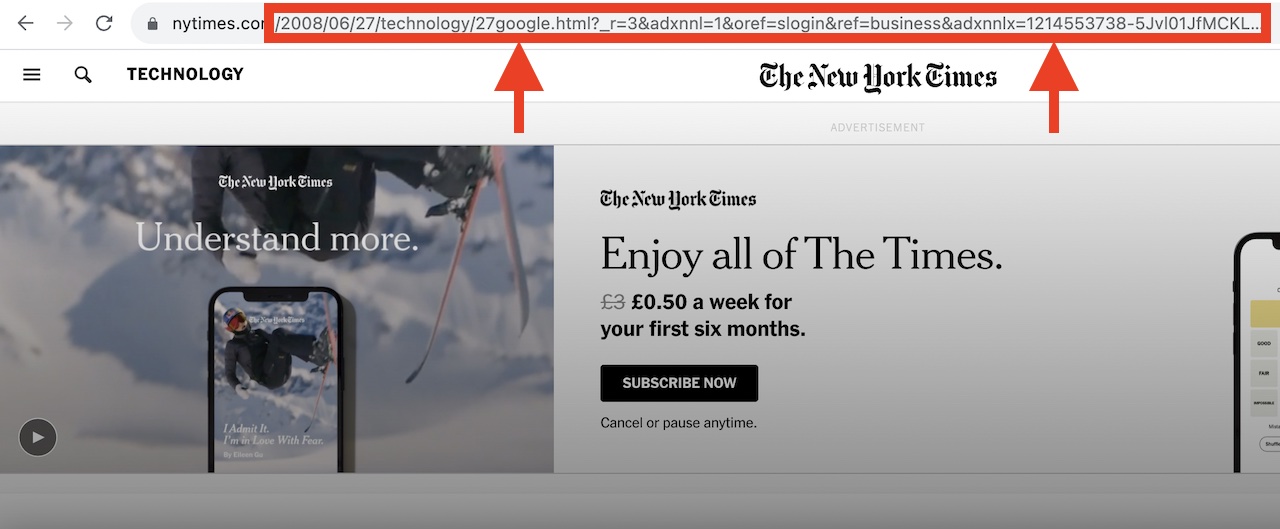URL Structure for SEO: A Beginner's Guide
Nailing down the right URL structure for SEO is key. Your URLs can either be a helpful roadmap or a confusing maze for search engines and users. Simplifying your URL structure can make it easier for search engines to crawl your site efficiently, leading to better rankings.
On the flip side, messy URLs with random strings of characters can hinder your SEO efforts and confuse visitors looking for specific content. By optimizing your URL structure, you pave the way for improved organic traffic and a smoother user experience on your site.
On Bloomberg's pages, the pages use a page ID number and session ID number, which is an example of how not to structure your URLs:

Importance of URL Structure
SEO Significance
Having a well-structured URL is vital. Optimized URLs can help boost your website's ranking on search engines. Search engines like Google consider the structure of your URLs when determining where to place your site in search results. For instance, a URL such as "yourwebsite.com/blog/tips-for-seo" is more beneficial than a generic one like "yourwebsite.com/page123".
Proper URL structure not only benefits SEO but also plays a crucial role in enhancing user experience (UX). A clear and concise URL makes it easier for users to understand the content they will find on your page before even clicking on the link. User-friendly URLs are more likely to attract clicks from visitors compared to lengthy and confusing ones.
User Experience
A well-crafted URL can significantly improve the overall usability of your website. When users see descriptive URLs that match their search intent, they are more inclined to click through and explore further. This seamless navigation contributes to a positive user experience, encouraging visitors to spend more time on your site and potentially convert into customers or subscribers.
Link building is another area where proper URL structure shines. When other websites find it effortless to link back to your content because of clear and relevant URLs, you increase the chances of attracting quality backlinks. These backlinks from reputable sites can further enhance your website's authority and credibility in the eyes of both users and search engines.
Understanding URL Structure
An effective URL structure includes relevant keywords that are easy to comprehend. By incorporating targeted keywords in your URL, you can enhance visibility on search engines. It's crucial to avoid unnecessary characters or parameters in the URL as they can make it complex and less user-friendly.
For example, Hike's pages, we have made sure to structure the URLs so they are concise, clear, and contain relevant keywords that relate to the page topic. The pages are also logically organized in a hierarchy:

Choosing a suitable URL type and optimizing its components will greatly impact your website's search engine performance.
Best Practices for SEO-Friendly URLs
Use of Hyphens
When structuring your URLs, use hyphens to separate words instead of underscores. Hyphens are recognized as word separators by search engines, aiding readability and interpretation. For example, instead of "best_practices_seo" opt for "best-practices-seo".
Incorporating hyphens helps search engines understand the meaning of each word in your URL. This clarity can enhance your site's visibility and relevance in search results.
Keyword Utilization
Including relevant keywords in your URL can significantly benefit your SEO strategy. Keywords provide vital context to search engines about the content on a page. When selecting keywords for URLs, ensure they align with the content and are optimized effectively.
Carefully choosing and optimizing keywords within URLs is crucial for maximizing their impact on SEO efforts.
Optimal Format
Crafting an optimal URL format involves creating short, descriptive links that incorporate targeted keywords naturally. Avoid using unnecessary numbers or special characters that may confuse both users and search engines.
Consistency in URL structure across your website aids organization and navigation while enhancing overall SEO performance.
Resolving Common URL Issues
It's crucial to address common issues like redirecting old URLs and updating existing ones. By implementing 301 redirects, you ensure that both search engines and users are seamlessly directed to the new URLs when you make changes. This not only maintains your site's credibility but also prevents any broken links from affecting your SEO performance.
Updating your URLs regularly is equally important for optimizing your site's search engine rankings. By incorporating relevant keywords or more descriptive terms into your URLs, you can attract specific traffic interested in the content you offer. Keeping your URLs current with any changes in content or site structure helps search engines better understand and index your website, ultimately boosting its visibility online.
Building SEO-Friendly URL Structure
Without Plugins
When optimizing URL structure for SEO, you have the option to do it manually without relying on plugins. This manual approach gives you more control and allows for customizations tailored to your website's needs. Understanding the principles behind URL structure is crucial for effective optimization. By grasping these fundamentals, you can create URLs that are both user-friendly and search engine optimized.
Standardizing URLs
Standardizing URLs across your website plays a vital role in enhancing consistency and improving user experience. When all your URLs follow a consistent structure, it becomes easier for search engines to crawl and index your site efficiently. This standardized approach not only benefits search engines but also helps prevent issues with duplicate content while reducing confusion among users navigating through your website.
Maximizing User Experience
URL Rankings
Optimizing your URLs can significantly impact your search engine rankings. Search engines like Google evaluate the quality and relevance of URLs when determining where a page should appear in search results. For instance, descriptive URLs that accurately reflect the content of a webpage tend to perform better in terms of visibility on search engine result pages.
Having well-structured URLs can also influence other ranking factors such as click-through rates and user engagement. When users see clear and relevant URLs, they are more likely to click on them, leading to increased traffic to your website. This means that by paying attention to your URL structure and ensuring it is optimized, you can improve your overall SEO performance.
Improved Navigation
Optimizing URLs for SEO not only benefits search engine rankings but also enhances user experience by improving website navigation. Clear and concise URLs make it easier for visitors to understand the content of a page before clicking on the link. Imagine searching for "best running shoes" online; wouldn't you be more inclined to click on a link with a URL like www.example.com/best-running-shoes rather than www.example.com/product123.
Below is another example of a poorly executed URL structure. Notice how NYTimes' URL contains a bunch of parameters, IDs and other information that is confusing for users and search engines and make the URL way too long:

Closing Thoughts
You've now grasped the essence of crafting SEO-friendly URLs. By understanding the significance of URL structure, implementing best practices, and optimizing for user experience, you're on track to enhancing your website's visibility and ranking. Remember, small tweaks can lead to significant improvements in your site's performance.
Take what you've learned here and apply it to your website. Audit your current URLs, make necessary adjustments following the best practices outlined, and keep user experience at the forefront of your optimization efforts. Your website's success in search engine rankings lies in the details of its URL structure. So, go ahead, dive in, and watch your SEO game soar!
Frequently Asked Questions
What is the importance of URL structure for SEO?
Your URL structure plays a vital role in SEO as it helps search engines understand your content better. A clear and concise URL can improve your chances of ranking higher in search results.
How can I build an SEO-friendly URL structure?
To create an SEO-friendly URL, keep it short, descriptive, and relevant to the page content. Include keywords but avoid stuffing them. Use hyphens to separate words for readability.
Does using HTTPS protocol impact my website's SEO performance?
Yes, implementing HTTPS positively impacts your site's SEO by providing a secure connection. Search engines like Google prioritize secure websites, which can boost your rankings and enhance user trust.
What are some common issues with URLs that need resolution for better SEO?
Common URL issues include dynamic parameters, irrelevant characters or numbers, lengthy URLs, and inconsistent structures across pages. Resolving these problems improves crawlability and user experience while boosting SEO.
How does a well-structured URL contribute to maximizing user experience on a website?
A well-structured URL enhances user experience by making it easier for visitors to navigate your site intuitively. Clear URLs help users understand where they are on the site and what to expect from the page content.
Hike SEO and URL Structure
Hike SEO is an all-in-one SEO platform that allows beginners, small businesses, and agencies to easily and quickly manage & improve their website SEO over time. Hike’s action engine flags up any errors or issues that should be reviewed & fixed for best SEO performance. This may include any issues within your URLs as well.
If you haven’t yet tried Hike, sign up today and see how easy it is to become empowered to take control of your SEO.